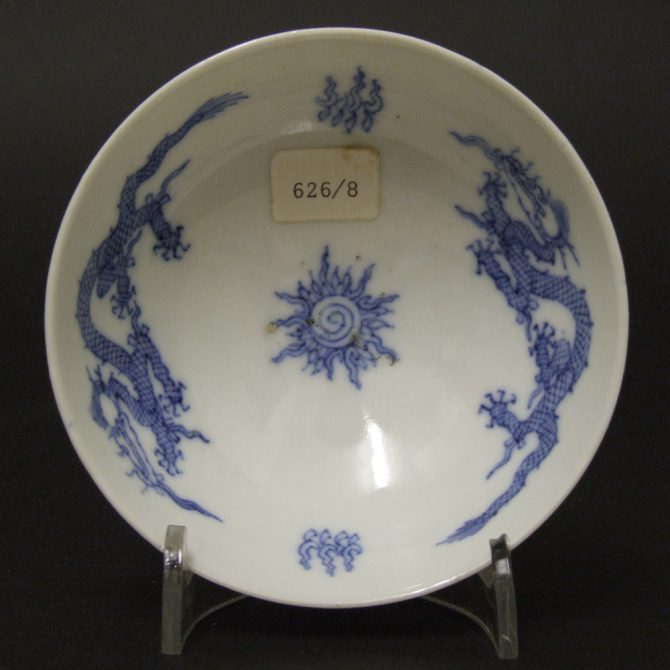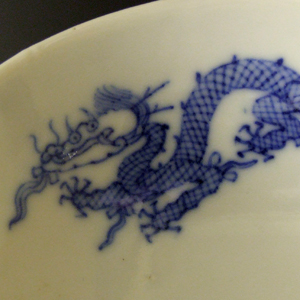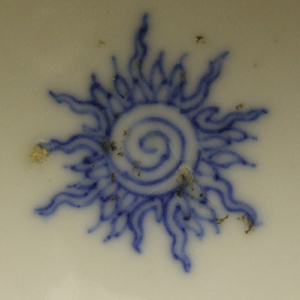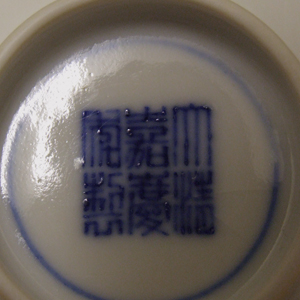
JIAQING MARK AND OF THE PERIOD 1796 – 1820 Imperial Jiaqing Porcelain
An Imperial Jiaqing Blue and White Porcelain Dragon Bowl. The Base with a Jiaqing Imperial Seal Mark in Zhuanshu Script and of the Period 1796-1820. The Finely and Thinly Potted Porcelain Bowl is Decorated with Two Imperial Five Claw Dragons Painted in a `Pencilled` Technique with a Flaming Pearl to the Well of the Bowl.
- Condition
- Perfect, small specks of kiln dust in the well of the bowl.
- Size
- Diameter : 9.5 cm (3 3/4 inches)
- Provenance
- Fine Nineteenth Century Chinese Porcelain, Earlier Ceramics, Furniture, Works of Art and Reference Book, Sotheby Parke Bernet, Hong Kong 1st and 2nd December 1977. Lot 626, One of eight bowls in the lot, we purchased all eight bowls. Original auction label to the interior of the bowl.
- Stock number
- 23145
Information
The cobalt blue is very strong against a blue white glaze.
Jiaqing 1796 - 1820 :
Qianlong`s fifth son Jiaqing was born in 1760 in the Old Summer Palace to Xiao Yi, Qianlong`s second favourite consort, who later had her role elevated to empress. In October 1795, in the 60th year of his reign, Emperor Qianlong announced his intention to abdicate in favour of Prince Jia: he did not think it proper to rule longer than his grandfather, Kangxi Emperor (1662-1722). Although becoming Emperor in 1796 it was not until the death of Qianlong in 1799 that he was able to stamp his authority on the Imperial Court and China as a whole. Jiaqing acted swiftly against the powerful Heshan, favorite of his father Qianlong, he was forced to commit suicide. Heshan had already weakened the empire, there was no money in the treasury and the people were hungry, it was so bad that widespread rebellion was almost constant between 1799 and 1803. A strong hard working man Jiaqing was not able to quell the secret societies such as the White Lotus Society and the Triads. Indeed he narrowly avoided assassination during a revolt in 1813. Jiaqing moved against Christianity, `The Great Qing Code` includes one statute titled "Prohibitions Concerning Sorcerers and Sorceresses". In 1811 a clause was added to it with reference to Christianity. It was modified in 1815 and 1817, settled in its final form in 1839 under Daoguang`s rule, and abrogated in 1870 under the Tongzhi Emperor. It sentenced Europeans to death for spreading Catholicism among Chinese and Manchus. Christians who would not repent their conversion were sent to Muslim cities in Xinjiang, to be given as slaves to Muslim leaders and beys. Jiaqing`s second son Daoguang was named as heir in 1799 and the two worked together until his death of heat stroke in 1820. Daoguang ruled China from 1820 t0 1850.
Information from : Chronicle of the Chinese Emperors, The Reign-By-Reign Record of The Rulers of Imperial China (Ann Paludan, Thames and Hudson, 1998. ISBN 0-500-05090-2) and Wikipedia.


